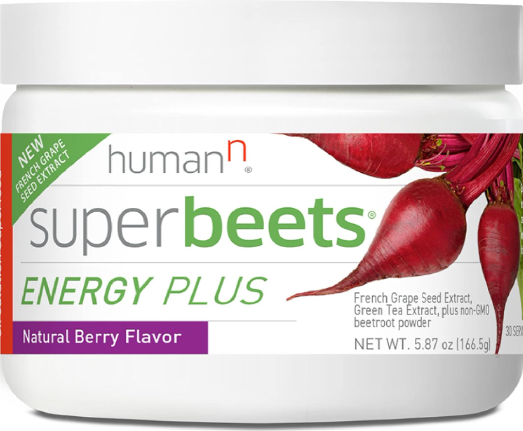Dietary supplements line the shelves of grocery stores, convenience stores, and health shops. Many of them make similar claims, and it can be hard to make the right decision.
Today, we provide a big overview of SuperBeets®. The good the bad and the reality.
Low energy and heart problems stem from inactivity, too much stress, and poor diet. If you suffer from energy crashes or heart problems, SuperBeets® may sound like a solution.
But is it?
What is SuperBeets®?
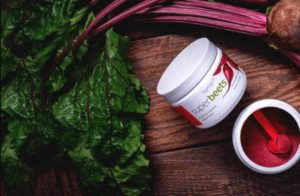
SuperBeets is powered beetroot that you can mix into beverages like smoothies and shakes. Its primary appeal is the concentration of Nitrates it provides.
HumanN (formerly known as Neogenis Labs), the company that manufactures and distributes SuperBeets® describes their supplement as a circulation superfood.
Like other supplements, SuperBeets® is not intended to treat or cure a disease.
SuperBeets is appealing to people who:
- Want a natural boost of energy
- Suffer from chronic stress
- Have a poor diet
- Want to maintain healthy levels of nitric oxide
- Wish to support normal blood pressure
- Want good circulation
We can think of several other ways to attain the goals above, but for today, we’re only looking at SuperBeets®.
Does SuperBeets® Deliver on Its Promise?
The makers of SuperBeets® claim to help “supercharge your intake of dietary nitrates and boost energy.”
What are Nitrates and Nitric Oxide?
Before you decide to go online and purchase SuperBeets®, it’s important to understand why and how it works.
It’s easy to take a company’s word on their product, especially if it seems natural and safe.
An energy boost?
That’s a bonus.
Unless you’re a medical professional or nutritionist, your knowledge of what goes on is limited, just like everyone else.
SuperBeets® is all about nitric oxide (N-O) and a nitrate-rich diet, but for many consumers, it may be lacking a clear explanation.
Here is how the makers of SuperBeets® explain N-O:
“It’s the master regulator of your cardiovascular system. It’s a signaling molecule which tells your blood vessels to relax, supporting healthy blood pressure and circulation, which naturally boosts energy.”
This may be overstated.
According to the American Journal of Clinical Nutrition, “Nitrites from vegetables and fruit may contribute to blood pressure–lowering effects.”
Are Nitrates Unhealthy?
Let’s back up and briefly discuss nitrates. You may be thinking:
Aren’t nitrates dangerous?
(Think hot dogs and bacon.)
According to Monica Reinagel, MS, LD/N, CNS, when nitrates are consumed alongside protein and in the absence of vitamin C, it can lead to cancer. This is the danger with processed meats—especially if they are consumed without some form of vitamin C along with them. You can read about it here.
On the other hand, we need nitrates to survive. The best sources are fruits and vegetables, which show no association with cancer. In fact, eating fruits and vegetables is associated with lower risks of cancer.
What Can You Expect from Taking SuperBeets®?
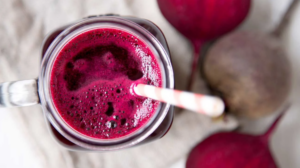
The company claims that users can expect to see improvement in their blood pressure, have better circulation, and feel more energized. We can’t find science to back this up, but we have found a lot of people who swear by this stuff.
PROS
-
Strengths of SuperBeets®
-
Supplement powder comes from U.S.-grown, non-GMO beets
-
It’s great for people who hate beets
-
Easy to use
-
Only one serving a day is needed
-
A four oz. “shot” equals three whole beets
-
100% refund if the product is within 90 days of purchase
-
Nitrate Oxide Testing Strips are free with certain quantity purchases
CONS
Drawbacks of SuperBeets®
-
Consumers may be confused by company name change
-
No free samples are available
-
Expensive
-
Supplements are not available in most stores
-
Can only be purchased online
-
Other beet supplements are less expensive
Reviews: What People Are Saying About SuperBeets®
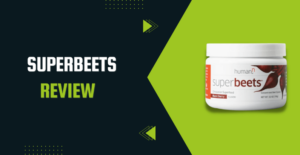
The reviews on SuperBeets® are fairly mixed, which is a big bummer for such an expensive supplement. Strange enough, our research found that most of the high-quality beetroot powders, which compete with SuperBeets® at a much lower cost, get far better reviews and ratings from consumers.
For instance, SuperBeets® costs $39.95 and averages about 3.5 stars on Amazon. A very high-quality competitor like this one costs $16 and averages almost 5 stars. Not only is it rated far better, it comes in a much larger quantity, making the price difference even more exaggerated. Our investigation into the quality of the ingredients found the only difference to be the non-GMO labeling on SuperBeets®.
Here’s what people are saying about SuperBeets®:
“I’ve had high blood pressure my whole life; been on medicine for years; started taking superbeets and notice my blood pressure was normal for once in my life. Stopped taking my blood pressure medicine. My blood pressure is better now than when I was just taking my blood pressure medicine” – Amazon
“My husband and I have been using Super beets for two months. We really like this product. I have noticed besides a nice energy boost I feel like I have much clearer thinking. I can’t clinically say it is responsible for this but I noticed it a couple of weeks after using. No side effects as others mentioned. Getting ready to order another round. Price is high but I am feeling better, BP is better. So that’s my story.” – Diet Spotlight
“Followed instructions drank some every morning until it was gone. I can honestly say I felt NOTHING, ZIP, NADA. Money wasted IMHO.” – HiYa
Published Studies
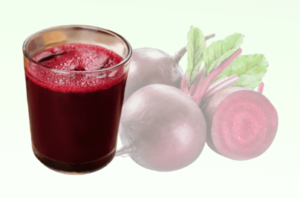
HumanN, the maker of SuperBeets® recently funded a study in which 13 older adults ingested the powder over a 4-week period. It was published in the American Journal of Physiology, which concluded the “findings potentially hold clinical implications for patients with chronic heart failure or obstructive sleep apnea“.
One of our awesome readers pointed out that in addition to being small and self-funded, the study did not use a separate control or placebo group to compare results, but rather set up the study so that the active subjects would also serve as the placebo group:
“subjects (older) assigned to the active group during the first arm of the study ( study days 1 and 2 ) received a placebo during the second arm ( study days 3 and 4 ), or vice versa, to serve as their own control group.”
You can read more about it by clicking on the link below:
A Study on Beetroot Juice Supplementation
In this study, conducted by the Department of Medical Sciences, Sports Physiology Lab, University of Cagliari, Italy, researchers recruited 14 male moderately trained swimmers.
The swimmers swam twice, once without beetroot juice supplementation (BJS) and the other with a week of BJS consumption.
In their findings, BJS proved to have a positive effect on athletic performance.
Participants were given no placebo as a comparison.
A Study on Beetroot Juice and Competitive Cyclists
In this study, 28 trained male cyclists with an average age of 20 years old participated. The participants took part in a six-week training camp at the Australian Institute of Sport.
Participants were given beetroot juice and then tested to see if their time trials improved.
Researchers concluded that nitrate-rich supplements were not effective enough to be recommended in athletic training.
A Study on Nitrate Supplementation in People with COPD
Many of the published articles on the effects of beetroot and/or nitrate supplementation only use healthy or athletic people as participants.
In this study, researchers take a look at how supplementation improves exercise performance for people with chronic obstructive pulmonary disease (COPD).
21 senior citizen-aged participants with COPD were given beetroot supplements (half had a placebo) three hours before exercise.
In their findings, researchers discovered that nitrate (beet) supplementation does not lower blood pressure or improve exercise performance in individuals with COPD.
Must Read- Best Weight loss Diet plans
Critical Remarks
As stated earlier, the consensus of SuperBeets® customers was mostly positive. For the most part, we don’t know the health status or age of any of the individuals.
Although the supplement can be used by almost anyone, it’s important to consider that the people who report positive experiences may already lead a healthy lifestyle.
Many of the reviewers who claimed SuperBeets® lowered their blood pressure were already taking a blood pressure medication. How do we know how effective SuperBeets vs. BP medication is?
Is the Supplement Better than the Real Thing?
Although HumanN takes pride in the fact that their ingredients contain no GMOs, there is no mention of how SuperBeets® is created.
Given the cost of the supplement, many consumers may prefer to buy beets or beet juice in the store or even purchase a similar, less expensive beetroot supplement.
HumanN tells us that it’s important to have a nitrate-rich diet, but falls short of telling us why their product is better than eating beets or using a cheaper brand.
Taking SuperBeets®

SuperBeets® is available in the original formula or as a black cherry flavor.
The ingredients consist of non-GMO Beetroot powder, non-GMO Fermented Beetroot powder, natural apple flavor, and stevia leaf extract.
The serving size is five grams (or one teaspoon) of powder. According to the “suggested” directions, mix one rounded teaspoon (five grams) thoroughly with four to six oz of water.
For best results, the powder should be dissolved in cold water and consumed immediately.
Many reviewers of SuperBeets® added the supplement to smoothies and shakes.
SuperBeets® should be stored in a cool, dry place and consumed within 45 days of opening.
Users should not exceed two servings (ten grams or two teaspoons) of SuperBeets in a 24-hour period.
Side Effects
Some SuperBeets® reviewers complained of upset stomach, constipation, diarrhea, and even headaches.
We noted that users should take no more than two servings per day.
HumanN fails to explain why we shouldn’t consume more than the recommended amount. Again, maybe it’s up to consumers to make their own conclusions.
Eating too many beets is known to increase the risk of gout, kidney stones, and gallstones.
Recalls
At this time, there is no history of recalls on SuperBeets®. There is no recall information on its parent company, HumanN or its former name, Neogenis Labs.
Lawsuits
Although many harsh critics across the Internet call the supplement a waste of money, no one has stepped up with any complaints worth suing over.

